How do we find the right voice in writing about ourselves?
I once gave a talk at the University of Hawai‘i, Mānoa, on that perennially perplexing question: "How do we writers find our voice?” A corollary question also interests me: "How do we write about ourselves without narcissism?"
I’ve devoted an entire New York Times column to “ The Voice of the Storyteller,” and a chapter in Sin and Syntax covers the subject of “Voice.” Not to mention a chunk of the epilogue of
The Voice of the Storyteller,” and a chapter in Sin and Syntax covers the subject of “Voice.” Not to mention a chunk of the epilogue of
 Vex, Hex, Smash, Smooch (which discusses voice in the larger context of literary style).
Vex, Hex, Smash, Smooch (which discusses voice in the larger context of literary style).
To sum it up quickly, voice comes down to a very individual blend of these elements:
 Word choice (simple? glorious? concrete? figurative?
Word choice (simple? glorious? concrete? figurative? quiet? dynamic?)
quiet? dynamic?) Sentence structure and syntactical habits (short? long? languid? lyrical?)
Sentence structure and syntactical habits (short? long? languid? lyrical?)- Tone (valence, attitude)
- Point of view (first, second, third, etc.)
- Pitch (how we adjust words and sentences to suit a particular audience)
My favorite examples of “voicy” writers include Joan Didion (The White Album, for starters), Junot Díaz (the short stories in Drown), Frank McCourt (Angela’s Ashes), Susan Orlean (The Orchid Thief ), Roger Angell (anything on baseball), and New York Times political columnists Francis X. Clines and Mark Leibovich. And let’s not forget Muhammad Ali.
In noodling around to see what other writers had to say on the subject, I found a fascinating passage by the memoirist Vivian Gornick, in  The Situation and the Story: The Art of Personal Narrative. Gornick argues that for personal nonfiction to work, the narrator must adopt a persona—separate from herself—so that she can transform the uniquely personal into something that can be felt and understood by others. The persona the writer arrives at, the narrator of a story, becomes a link between writer and reader, allowing the reader to feel the truths that the writer is trying to express through the story, but without self-righteousness, self-pity, or self-aggrandizement. Gornick uses an example from her own writing to develop this idea. She was attempting to write a memoir about herself (as a child), her mother, and a woman who lived next door to them. She explains:
The Situation and the Story: The Art of Personal Narrative. Gornick argues that for personal nonfiction to work, the narrator must adopt a persona—separate from herself—so that she can transform the uniquely personal into something that can be felt and understood by others. The persona the writer arrives at, the narrator of a story, becomes a link between writer and reader, allowing the reader to feel the truths that the writer is trying to express through the story, but without self-righteousness, self-pity, or self-aggrandizement. Gornick uses an example from her own writing to develop this idea. She was attempting to write a memoir about herself (as a child), her mother, and a woman who lived next door to them. She explains:

To tell that tale, I soon discovered, I had to find the right tone of voice; the one I habitually lived with would not do at all: it whined, it grated, it accused, above all it accused. Then there was the matter of syntax: my own ordinary everyday sentence—fragmented, interjected, overriding—also wouldn't do; it had to be altered, modified, brought under control. And then I could see this as soon as I began writing, that I needed to pull back— back—from these people and these events to find the place where the story could draw a deep breath and take its own measure. In short, a useful point of view, one that would permit greater freedom of association—for that of course is what I have been describing had to be brought along. What I didn’t see, and that for a long while, was that this point of view could only emerge from a narrator who was me and at the same time not me.
The poet Billy Collins echoes some of this in an interview with Joel Whitney, which originally appeared in Guernica Magazine. (“ A Brisk Walk: Billy Collins in Conversation” is also available online.) Collins is reflecting on “this pet phrase about writing that is bandied around particularly in workshops about ‘finding your own voice as a poet.'” He starts by saying he supposes that phrase refers to the process in which “you come out from under the direct influence of other poets and have perhaps found a way to combine those influences so that it appears to be your own voice.” He continues:
A Brisk Walk: Billy Collins in Conversation” is also available online.) Collins is reflecting on “this pet phrase about writing that is bandied around particularly in workshops about ‘finding your own voice as a poet.'” He starts by saying he supposes that phrase refers to the process in which “you come out from under the direct influence of other poets and have perhaps found a way to combine those influences so that it appears to be your own voice.” He continues:

But I think you could also put it a different way. You, quote, find your voice, unquote, when you are able to invent this one character who resembles you, obviously, and probably is more like you than anyone else on earth, but is not the equivalent to you. It is like a fictional character in that it has a very distinctive voice, a voice that seems to be able to accommodate and express an attitude that you are comfortable staying with but an attitude that is flexible enough to cover a number of situations. The character I invented, if I had to describe him, is probably an updating of a character you find strolling through the pages of
English Romantic poetry. He is a daydreamer, obviously unemployed, plenty of time on his hands, spends a lot of time by himself, and has an unhealthy fascination with his thinking process, his own speculations and fantasies. So he is not a really new character. He is kind of a remodeling of this earlier Romantic character, the poet who would find himself daydreaming on a wayside bench somewhere.
(Collins’s interviewer, Joel Whitney, interjects that that person, Collins’s poetic persona, has been described by others as “affable, congenial, polite, welcoming.”) Collins had more to say about voice and many other things in  an interview with George Plimpton in The Paris Review. My favorite snippet of that
an interview with George Plimpton in The Paris Review. My favorite snippet of that long interview was what Collins said is a founding principle in his writing classes, his opening remarks to a classroom of would-be writers:
long interview was what Collins said is a founding principle in his writing classes, his opening remarks to a classroom of would-be writers:

The most difficult question you can put to people who want to write poetry is this: Ask yourself if what you are trying to say can be said in any other form—story, memoir, letter, phone call, e-mail, magazine article, novel. If the answer is yes, stop writing poetry. Put it in an e-mail, write a memoir, write a letter to your granny, use whatever form will accommodate what you’re going to say. Stop writing poetry unless you’re doing things that you can only do in poetry. And that means exercising your imaginative freedom, because in a poem you have the greatest imaginative freedom possible in language. You have no allegiance to plot, consistency, plausibility, character development, chronology. You can fly. Clear the trees at the end of the runway, and off you go. So if you’re not taking advantage of the giddy imaginative liberty that poetry offers, you should try a form that’s a little more restrictive. Of course, if I say that in the first class, it’s kind of deadening. Maybe it’s better left for the last class.
Collins’s comment could be tweaked for any genre of writing. Not only is the writer’s voice important, but so is his discretion. We need an understanding of the nature of genre, and a certain steadiness in it.
—Constance Hale
| |
Share This:




